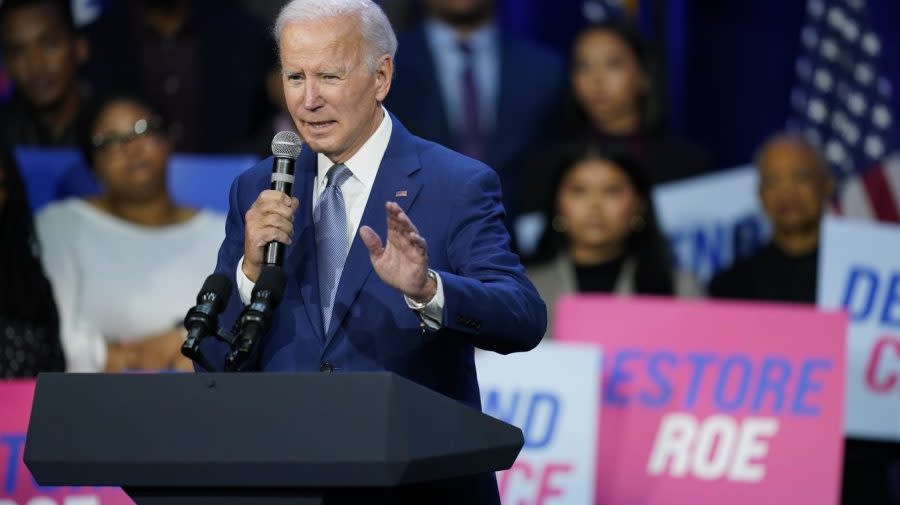Biden exhausting abortion actions, but sees prime target in Trump

President Biden and Democrats want to make abortion a signature issue of the 2024 election, but the White House is exhausting its already limited powers on reproductive rights.
With few tools to protect abortion access at the federal level, Biden and his party are ramping up warnings about a national abortion ban if Republicans return to the White House and win control of the House and Senate.
On Friday, the Biden-Harris campaign doubled down on abortion as a key election issue, tying the end of Roe v. Wade directly to former President Trump, the likely GOP nominee.
“When Americans go to the polls on Election Day this November, they will go knowing that the fate of every American woman’s freedom to make her own health care decisions is on the line,” campaign manager Julie Chavez Rodriguez said in a memo.
“They will also know that the horrific alternative — the chaos, confusion, and uncertainty women whose rights have been ripped away are experiencing right now — falls squarely at the feet of Donald J. Trump.”
Health and Human Services (HHS) Secretary Xavier Becerra spoke with reporters this week about the administration’s efforts on abortion, ahead of the 50th anniversary of the Supreme Court’s ruling that effectively guaranteed abortion rights.
He highlighted recent administration efforts to confront the country’s maternal health crisis, which disproportionately impacts Black women, but avoided specifics when asked what other avenues the White House was looking at to expand abortion access.
“We continue to work on any opportunities we have through the existing authorities that Congress has given us,” Becerra said, noting recent efforts to support maternal health in the U.S.
“But in terms of any additional regulatory authorities, we continue to explore that, and we continue to defend all that we currently have,” he added.
Experts said the perception that Biden is running low in his arsenal of new actions could be partly due to the barrage of actions after the Dobbs decision in 2022.
“I think that they have done what they can to kind of keep this issue central to the work across HHS and other agencies as well,” said Alina Salganicoff, KFF senior vice president and the director of the Women’s Health Policy Program.
“With the current restrictions, to do a very broad, meaningful change in terms of abortion access, it’s extremely challenging on the federal level,” Salganicoff said.
However, Amy Friedrich-Karnik, director of federal policy at the Guttmacher Institute, told The Hill that more can always be done to support abortion access.
One step is finalizing the many proposed rules that federal agencies have put forth. Among the proposed rules she believes should be finalized is an HHS-proposed rule to modify HIPAA standards regarding protected health information on reproductive health care.
These rules, however, have faced intense legal pushback from anti-abortion groups and legislatures.
The Biden administration has also taken on the fight in courts, trying to exert federal authority to protect access to abortion pills and lifesaving abortion care at the state level.
The federal government is currently engaged in a legal battle to uphold the Emergency Medical Treatment and Labor Act (EMTALA), which protects doctors who provide emergency, lifesaving abortion care.
The Supreme Court recently ruled that Idaho could continue enforcing its abortion ban, though the government argues it violates EMTALA.
The Department of Justice has also asked the Supreme Court to end a challenge that could limit access to the abortion pill mifepristone, which has been used widely for decades.
Outside of rules and legal battles, Friedrich-Karnik said the president’s annual budget was another opportunity to send a strong signal in support of abortion access — though the GOP majority in the House would block any provisions.
Republicans have regularly used spending bills to send the opposite message, such as adding abortion restrictions to must-pass spending bills such as the annual National Defense Authorization Act.
Friedrich-Karnik warned of a “treasure trove” of methods that the anti-abortion movement could use in attempt to further restrict reproductive health access.
Salganicoff said the Comstock Act of 1873 could become a focus of future efforts, since it makes it illegal to send “immoral” or “indecent” items through the mail, which originally included items having to do with contraception or abortion.
Roe prevented the Comstock Act from being used to block contraception and abortion materials from being mailed, but now that Roe’s been overturned, Salganicoff said the old law is back in play.
“If we were to have a different administration … it’s possible that they could decide to use whatever. Even a law that’s so antiquated could be revived and enforced,” said Salganicoff.
As the calendar turns to 2024, Vice President Harris has taken a leading role in sounding the alarm over the future of abortion access — if voters don’t elect Democrats. During an appearance on “The View” this week, she said she was “scared as heck” about a second Trump term in the White House and sounded a dire warning about abortion.
“Many of us often think about the future of our country in the context of our children, and so they talk about their concern that if their daughter is going to college, will she go to a state where she will have access to the health care she might need including reproductive health,” Harris said.
“So many of us actually grew up when Roe was intact, and we would absolutely say, ‘We must protect it, a woman’s right to choose.’ But we kind of believed it was always going to be there. And look what happened,” she said. “And I say that in the context of this democracy also. Don’t take anything for granted.”
For the latest news, weather, sports, and streaming video, head to The Hill.


